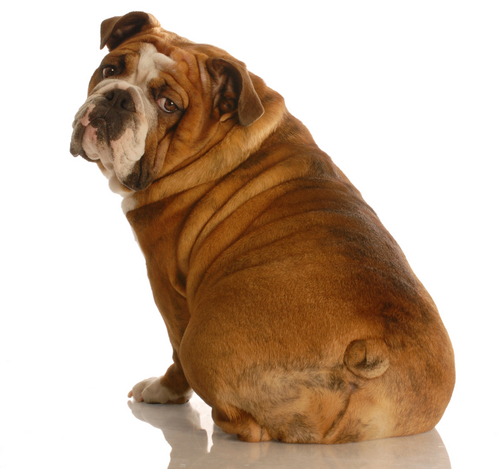Have you ever noticed a foul odor wafting soundlessly from your dog’s posterior? Then noticed it again later after the first one has dissipated? Let’s face it, dogs fart. But why do some dogs clear the room with their gas all the time?
It comes down to where gas in the intestinal tract comes from. Extra air can come from the mouth and be swallowed with food. Sometimes it will exit the other end, but with a lovely added aroma that it picks up on its way through the bowels. If your dog is a fast gulper or has a short face (like a pug, boxer or bulldog), chances are he will gulp more air than a delicate eater with a longer face. Sometimes all you have to do to help with this source of gas is slow him down. You can do this by feeding him with a puzzle bowl or toy that he has to figure out in order to get the food out. You can also place tennis balls in the bowl, so he has to nose around them to really clean his plate. If you have time, you can hand feed him the kibble and ask him to perform tasks to get it. This game can be fun for you both and builds your training foundation and your bond.

A lot of times, the excessive gas is being produced by the digestive process in the bowel. A small amount of gas is a normal by-product of digestion, but extreme gas can be a real social issue. It could also be a warning sign that things are not running smoothly. Make sure that your dog is eating a super-premium dog food (not just one that has the flashiest ads on the internet-ask your vet for advice or call the phone number on the bag and ask if they employ a veterinary nutritionist to help formulate and troubleshoot their diet). The most digestible and highest quality diet are easier for your dog to digest and tend to produce less flatulence.
Many dogs can benefit from probiotic supplements. Probiotics are healthy bacteria that we want to encourage in the bowel. These “good guys” can be helpful in the digestion of foods and may have a positive impact on other areas of health. Choosing supplements is another area where advertising is not your best friend. The supplement industry is not government regulated and products may not be what they seem. Ask your veterinarian to give you brand names of probiotic supplements that they feed to their own pets.
If your dog has any other signs of GI upset in addition to gas, like rumbling bowel sounds, diarrhea/constipation and/or vomiting, there might be something wrong that needs medical intervention. Call your vet and make sure that you mention all the things you have noticed. Your vet can help make sure that your dog is not suffering from a dietary sensitivity or inflammatory bowel disease, among other important issues.

If your dog runs you out of your room or car, double check that he or she is not gulping air from fast eating. Be sure that the diet is one that is high quality and easy to digest with minimal additives and fillers. Consider adding a probiotic each day and always mention even the smallest concern to your veterinarian. We are here to make life with your dog as pleasant as it can be, for him and for you.
Find Dr. Primm on Facebook here.

Editor’s Note: iHeartDogs recently completed the formulation of what we believe to be the most complete canine probiotic on the market, Pronine™ Flora. This is a 4-in-1 product, including probiotics, prebiotics, digestive enzymes, and digestive herbs. You can learn more about Pronine™ Flora here.
